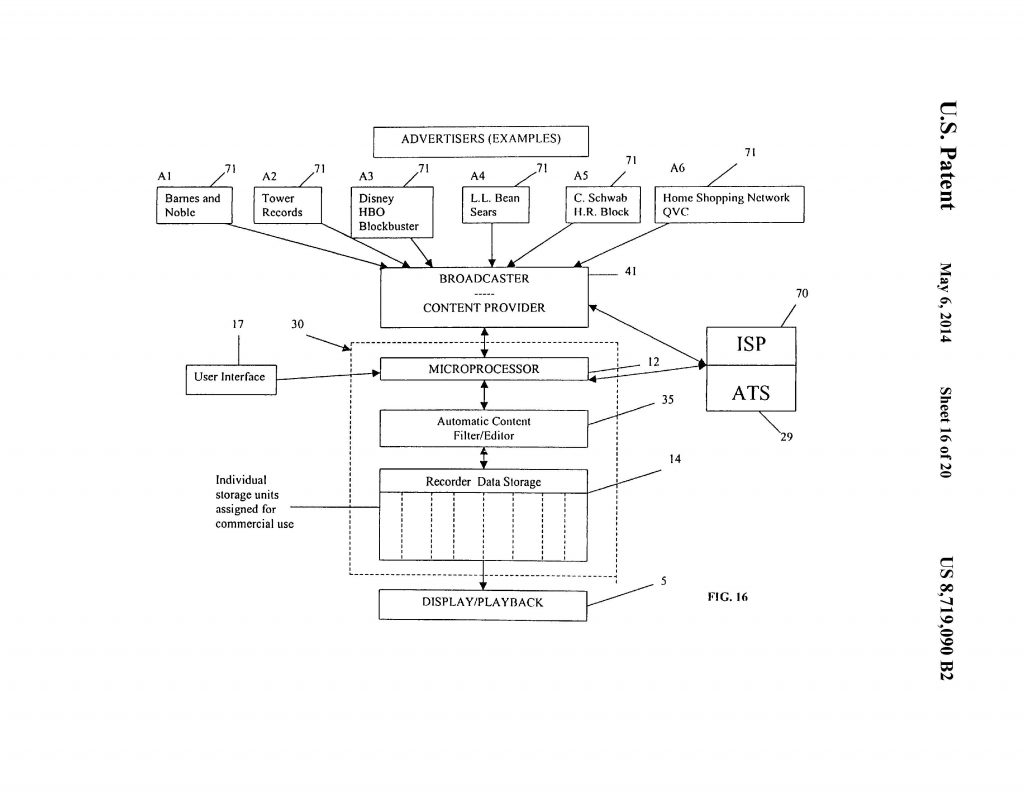CUSTOMEDIA TECHNOLOGIES, LLC V DISH NETWORK, FEDERAL CIRCUIT 2020 (SOFTWARE PATENTS)
 Customedia appealed a decision by the U.S. Patent and Trademark Office holding claims of U.S. Patent No. 8,719,090 and 9,053,494 ineligible under 35 U.S.C. § 101.
Customedia appealed a decision by the U.S. Patent and Trademark Office holding claims of U.S. Patent No. 8,719,090 and 9,053,494 ineligible under 35 U.S.C. § 101.
The patents both relate to a cable TV set-top box. A cable distributor may provide customers with a cable set-top box with built-in storage sections that may be leased or sold to advertisers.
Claim 1 of U.S. Patent No. 8,719,090 is representative and recites:
1 A data delivery system for providing automatic delivery of multimedia data products from one or more multimedia data product providers, the system comprising:
- a remote account transaction server for providing multimedia data products to an end user, at least one of the multimedia data products being specifically identified advertising data; and
- a programmable local receiver unit for interfacing with the remote account transaction server to receive one or more of the multimedia data products and for processing and automatically recording the multimedia data products, said programmable lo-cal receiver unit including at least one individually controlled and reserved advertising data storage section adapted specifically for storing the specifically identified advertising data, said at least one advertising data storage section being monitored and controlled by said remote account transaction server and such that said specifically identified advertising data is delivered by said remote ac-count transaction server and stored in said at least one individually controlled and reserved advertising data storage section.
The Federal Circuit said that they must follow the Supreme Court’s two-step framework for determining patent-eligibility under § 101 according to Alice Corp. Pty. Ltd. v. CLS Bank Int’l.
At Alice step one, the Federal Circuit must determine whether the claims are directed to an abstract idea. in Alice, the Supreme Court made clear that the invocation of a computer does not necessarily transform an abstract idea into a patent-eligible invention. There, the Supreme Court held ineligible claims directed to a method of exchanging financial obligations using a computer system as a third-party intermediary. The Court explained that the claims were merely implemented “using some un-pecified, generic computer” and did not “purport to improve the functioning of the computer itself.
Customedia argued that its claims are patent-eligible because they provide for improvements to the functioning of computer systems. The Federal Circuit disagreed.
By dedicating a section of the computer’s memory to advertising data, the claimed invention ensures memory is available for at least some advertising data. This does not, however, improve the functionality of the computer itself, according to the Federal Circuit.
Even if the court accepted Customedia’s assertions, the claimed invention merely improves the abstract concept of delivering targeted advertising using a computer only as a tool. This is not what the Supreme Court meant by improving the functioning of the computer itself, according to the Federal Circuit.